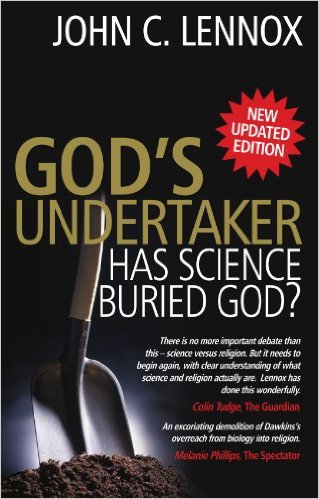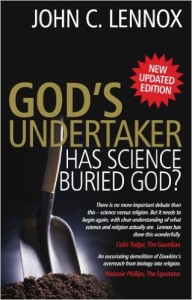We live in a secular age, at least in the West, in which the dominion of science for all the good it has done has essentially replaced God for many people who find religion untenable. If “Science” says it, people believe it, few questions asked. In a little discussion with a co-worker recently the issue of religion came up, and being the consistent agnostic she is she said, “I’ll stick with science.” I guess she thinks science can answer the questions and address the issues religion and philosophy address. It can’t. She obviously hasn’t thought deeply about any of this. No surprise. Most Americans don’t.
Many atheists misuse the authority of science as a battering ram against belief in God, as if science itself makes belief in God a relic of a bygone era of simplistic faith. One reason they do this is because they define faith in a perversely self-serving way. Faith, which for them only applies to religious belief, is either believing something when evidence is lacking, or believing something we know is not true. If that is what faith actually is, I wouldn’t be religious either!
For them faith takes over when evidence is lacking; but in fact faith is a fundamental aspect of the human experience. We all utilize faith, which is a synonym for trust, when we have enough evidence to justify that trust. Most atheists really believe that the religious are given a command that goes something like this: there is no evidence, so just BELIEVE! This is a mischaracterization which would almost be funny if it wasn’t so sad. Those who wish to think clearly about such things will not be deluded by such facile and spurious assertions. They will, rather, be able to place science in its proper context, giving it the due it deserves, nothing more, nothing less.
For those who might like to think more clearly about such things, or just get a different perspective from the reigning paradigm, I would suggest a book by John C. Lennox, Professor of Mathematics at the University of Oxford, called God’s Undertaker: Has Science Buried God? Although I come to such a book absolutely convinced that science has done nothing of the sort, Lennox has a way of putting things that seems like it would be impossible for even a hardened atheist to disagree with. I’ll give just one brilliant example:
As we look back over the history of science we have every reason to be grateful to the brilliant thinkers who took the brave step of questioning the mythological view of nature that endowed various bits of the universe with divine powers they did not possess. We have seen that some of them did so, not only without rejecting the concept of a Creator, but in the very name of that Creator. Perhaps there is a subtle danger today that, in their desire to eliminate the concept of a Creator completely, some scientists and philosophers have been led, albeit unwittingly, to re-deify the universe by endowing matter and energy with creative powers that they cannot be convincingly shown to possess. Banishing the One Creator God they would end up with what has been described as the ultimate in polytheism–a, universe in which every particle has god-like capacities.
How exquisitely ironic!
Have you ever heard or read someone say that evolution does such and such? They ascribe to an unguided, impersonal, and purposeless force something only a personal, purposeful and guiding agent can do. Someone might offer a rejoinder that this is just a matter of speaking, anthropomorphizing a process that doesn’t actually require any anthropos (Greek for man), or personal agent. But this only makes the point even more persuasive: they have to anthropomorphize! How else can you account for the grandeur and beauty and complexity that is the universe and everything in it? Intuitively we all know something cannot come from nothing.
I came across a talk some time ago that nails why I and the vast majority of the human race find atheism/naturalism so untenable. The speaker said something to the effect that if you are an atheist you have to believe that:
Chaos produces order,
lifeless matter produces life,
chance produces intelligence, and
accidents produce purpose.
This is simply undeniable; order, life, intelligence, and purpose exist, and they came from . . . . nothing? Now that takes a lot of faith!



For some reason I can’t reply to this rayster character, so here are my thoughts about his comment:
Rayster, please don’t embarrass yourself like this. Your assertions are groundless, baseless and reveal a level of ignorance not unknown among modern atheists.
Science tells us what IS, not what OUGHT to be (religion).
Modern morality developed from natural bio-evolutionary survival adaptations. Modern morality IS science and always was.
The three major monotheisms Christianity, Judaism and Islam all developed syncretically from pagan religions.
The burden of proof is on theists.
Stop looking upwards, look forward.
The Golden Rule.
Science tells us what IS, not what OUGHT to be (religion).
Modern morality developed from natural bio-evolutionary survival adaptations. Modern morality IS science and always was.
The three major monotheisms Christianity, Judaism and Islam all developed syncretically from pagan religions.
The burden of proof is on theists.
Stop looking upwards, look forward.
The Golden Rule.
I agree that the more we learn about the Universe, the more a case can be made for some kind of intelligence outside of the system, but as an agnostic that grew up evangelical (believing the earth was only 6,000 years old), I have a problem with religion that ignores what science is teaching us. I now see there’s no doubt this earth is very old and it changes ones perspective on a lot of things. Most mythologies serve a beneficial purpose (Joseph Campbell), and science will never disprove God, nor is that most scientists intention.
This is without a doubt the best argument I have heard for existence of God. I think I should keep it in the back of my mind for future debates! Thank you!
Creator God, the best friend to science. The reason that humans can do science is that we are gifted in His likeness (but have fallen very short in the mean time.) Of course others will argue that there is no reason why we can do science or any purpose that we should do science-just “lucky” molecules.
Thanks, Phil. You are a brave man!
Well said. I have been in the academic community most of my adult life and continue to be astonished about how one’s language betrays one’s worldview. C.S. Lewis was right in calling materialistic atheism a philosophy for school boys.
[…] here to read […]